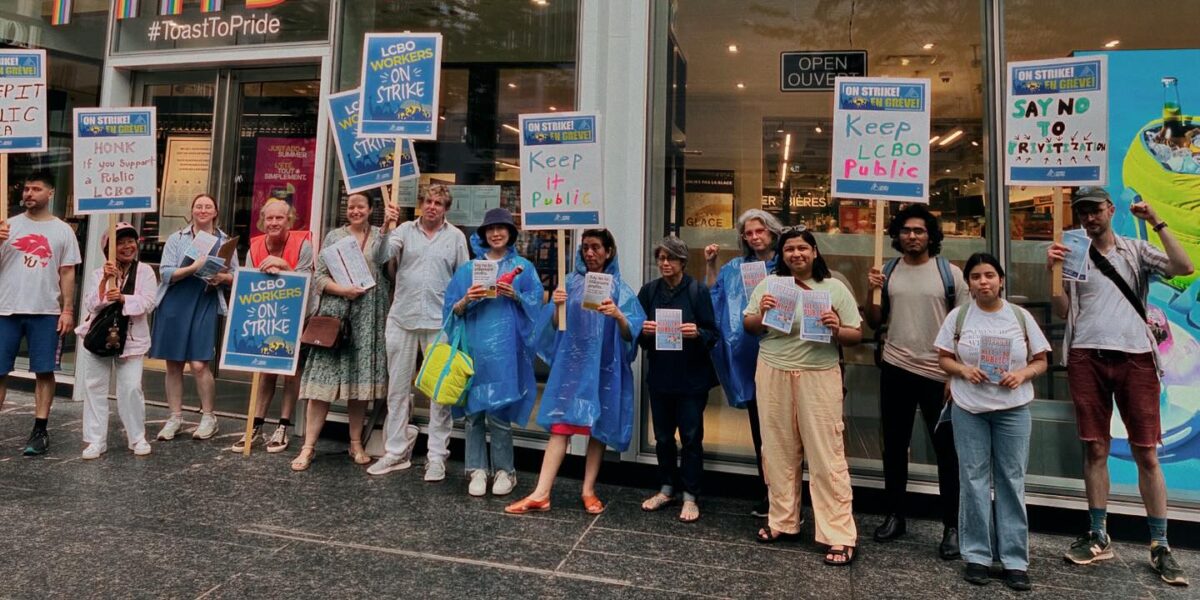At 12:01 am on Friday morning, more than 9,000 Liquor Control Board of Ontario (LCBO) workers began strike action against the liquor retailer. The union representing striking workers has said privatization is one of the key issues that led workers to strike.
In May, Ontario Premier Doug Ford announced a plan to expand the availability of alcoholic beverages in grocery stores and convenience stores. Under this plan, eligible grocery and big-box stores will be able to sell beer, cider, wine and ready-to-drink beverages, including in large pack sizes by the end of October.
Ontario Public Service Employees Union (OPSEU), which represents striking LCBO workers, opposed this plan and said it would take revenue away from much needed public services.
As well, data from the Canadian Union of Public Employees (CUPE) shows just how dire privatization could be for working conditions.
“The public sector is not perfect by any means,” said Alia Karim, a senior research officer at CUPE, “but it can offer better conditions of work.”
Karim said that once profit becomes a consideration for employers, work conditions tend to become worse. The “profit motive,” according to Karim, puts employers under more pressure to bust unions, lower wages and go against workers. As such, they will often do these things more aggressively than may happen in the public sector.
LCBO is not the only place that is struggling against privatization. Etobicoke housekeeping jobs represented by CUPE are among the many others who may see their jobs handed over to the private sector.
Concerns for public sector workers remain consistent when privatization looms, according to Karim. Stagnating wages and deteriorating working conditions remain top of mind when a move is made to privatize a workplace.
Karim said the situation of LCBO workers is unique because there is always a profit consideration, even though the store is part of the public sector.
“There you can see, over the decades, the deterioration of working conditions. More people are being hired part-time, casual or precariously at lower wages,” Karim said.
OPSEU figures show 70 per cent of LCBO workers are casual. Workers don’t have guaranteed hours, which means most won’t have access to benefits and there aren’t opportunities to move into permanent part-time and full-time positions.
“[Doug Ford] is wasting upwards of a billion dollars of our money to fast-track privatized alcohol sales and hand more of the public revenues generated by the LCBO over to the CEOs and big box grocery and convenience chains like Loblaws and Circle K,” said OPSEU President JP Hornick in a press release.
In a press release, the Ontario government said the alcohol everywhere plan would increase convenience, and create a more open alcohol beverage marketplace.
OPSEU said there are other ways to increase convenience which would not take away from revenue used to fund health care and education.
“We argued that we grow the LCBO to meet demand and increase convenience by opening more stores, increasing the hours of operation, and increasing warehousing, logistics and e-commerce capacity,” an OPSEU press release reads. “When you buy from the LCBO, including spirit-based ready-to-drink beverages, that should help build Ontario – not pay for a billionaire’s new yacht.”
OPSEU said in their press release their alternative path to increasing convenient alcohol purchases would promote opportunities to build good, stable employment.
“We told Ford not to ruin everybody’s summer,” said Hornick, “but now he’s closed the Science Centre and forced a dry summer for Ontarians by refusing to offer a deal that would be good for LCBO workers and Ontario.”
Did you enjoy this article? Coverage on stories like this one is only made possible by your generous support. If you appreciate the work rabble does, please consider gifting a one-time or monthly donation during rabble.ca’s summer fundraiser here.



